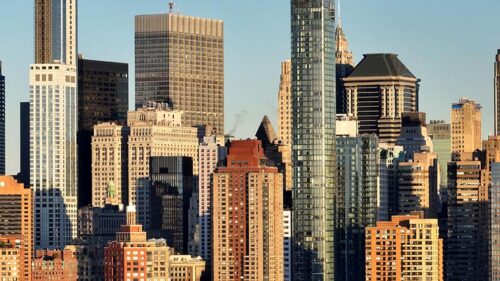Fixing aging infrastructure in light of HVAC regulations like Local Law 97 and the AIM Act is crucial for building owners, facility managers, and NYC business owners. In this blog post, we’ll explore the challenges, compliance strategies, and success stories to guide you through this transition.
The Challenge Ahead
Though New York City is lined with buildings and skyscrapers, the reality is that many of the buildings are plagued with aging infrastructure and outdated HVAC systems, which significantly impact building emissions and energy consumption. The introduction of Local Law 97 and the AIM Act underscores the urgent need to address these issues. This blog will tackle the current state of NYC’s aging infrastructure, emphasizing how these regulations aim to reduce carbon footprints and improve energy efficiency.
Understanding Local Law 97 and the AIM Act

Local Law 97, part of NYC’s Climate Mobilization Act, mandates significant reductions in greenhouse gas emissions from large buildings. With a schedule that grows increasingly tighter through 2050, Local Law 97 sets stringent carbon emissions limits that ultimately penalize buildings for non-compliance.
Meanwhile, the AIM Act — which received bipartisan support — targets the phasedown of hydrofluorocarbon (HFC) refrigerants, commonly used in HVAC systems. These regulations impose strict emission limits and deadlines, pushing building owners and managers to revamp their infrastructure. Compliance not only avoids hefty fines but also contributes to a more sustainable city.
By 2050, the AIM Act is expected to reduce greenhouse gas emissions equivalent to 4.6 billion metric tons of carbon dioxide, a significant step towards mitigating the effects of climate change and protecting the planet for future generations.
The Impact on Business
For building owners and facility managers, the financial implications of these regulations cannot be understated and ignored. Upgrading HVAC systems might seem costly initially, but the long-term benefits, including reduced energy bills and increased property value, are substantial.
Beyond cost, businesses must consider their environmental responsibility, as greenhouse gas emissions have become a focal point in talks of both legislation and climate change. Complying with these regulations not only positions your company as a leader in sustainability, enhances your reputation, and attracts eco-conscious clients and tenants, but also improves employee/occupant productivity and promotes a healthy environment.
Strategies for Compliance
Adhering to Local Law 97 and the AIM Act requires a strategic approach. Keep these pointers in mind:
- Begin with a comprehensive energy audit to assess your current HVAC system
- Identify outdated equipment and areas where energy efficiency can be improved
- Upgrading to energy-efficient HVAC technology, such as variable refrigerant flow (VRF) systems or heat recovery systems, is a practical step
- Make the switch to Refrigerant R-454b
- Financing options, including green loans and incentives, can ease the financial burden, making these upgrades more accessible
Looking to the Future
In all, the long-term implications of these regulations extend beyond immediate compliance. They signal a shift towards more sustainable building practices, encouraging innovation and progress in the industry. As technology evolves, we can expect even more efficient HVAC systems and smarter building management solutions. By staying ahead of these trends, building owners and facility managers can future-proof their properties, ensuring they remain compliant and competitive in an increasingly eco-conscious market.
Maintain Compliance with HVAC Regulations with Donnelly Mechanical
Addressing NYC’s aging infrastructure in light of Local Law 97 and the AIM Act is not just about compliance; it’s about improving energy efficiency, reducing costs, and enhancing the sustainability of your building. By understanding the regulations, assessing your current systems, and implementing strategic upgrades, you can position your business for long-term success.
However, you cannot hit these milestones alone. Your business needs a professional HVAC service company to bring your building up to code — and there are no NYC-based contractors better than those at Donnelly Mechanical. With over 30 years of industry leadership, Donnelly brings the experience and resources needed to ensure your building remains in compliance with looming HVAC regulations.
Don’t get lost as compliance grows more stringent — visit Donnelly Mechanical’s website and get in touch today to get your building prepared for the future.